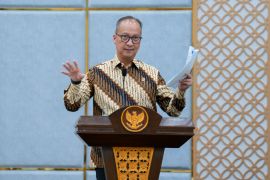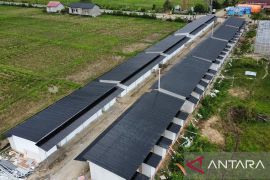The International Monetary Fund (IMF) projected that 2023 will be a difficult year for the global economy, as main engines of the world's economic growth -- the United States, China, and the euro area -- are experiencing stalling growth.
As China is still recovering from the COVID-19 pandemic, other regions in Europe are facing geopolitical conflicts, and central banks raised their interest rates to curb inflation.
Facing the risk of an economic slowdown, Indonesia has prepared itself with policies, one of which is fiscal support through the 2023 State Budget (APBN) that is considered responsive and accommodative.
On December 30, 2022, President Joko Widodo officially lifted public activity restrictions (PPKM) against COVID-19 that eased public mobility and triggered more activities outdoors.
The PPKM policy was lifted after observing Indonesia's COVID-19 cases for 10 months that have been under control.
The easing of community mobility is a new factor that strengthens economic resilience internally because its impact can improve the performance of the service, manufacturing industry, and the micro, small, and medium enterprises (MSMEs) sectors.
With the PPKM revocation, the flow of goods and people's mobility is expected to be smooth, and the undisturbed distribution of foodstuffs will stabilize prices, therefore, maintaining national inflation.
Inflation
The disrupted global food and energy supply chains due to the pandemic and geopolitical turmoil have contributed to the global increase in inflation and affected domestic conditions.
Inflation negatively impacts low-income people's purchasing power and withdraws the recovery of long-distance mobility.
Responding to the surge in inflation, several countries have tightened their monetary policies by increasing their interest rates, which put more pressure on the global economy.
This continued pressure can lead to stagflation, a combination of high inflation and economic stagnation, and weaken the global labor market due to falling real wages and demand for credit.
In the domestic sector, there are two options to face this, either maintaining inflation with the risks of rising interest rates or facing a potential recession by lowering the interest rates to get the economy moving again.
According to Statistics Indonesia (BPS), Indonesia's year-on-year inflation in 2022 was recorded at 5.51 percent, which was largely contributed by price movements in the transportation and foodstuffs sectors.
Finance Minister Sri Mulyani Indrawati said that 2023 will present several hard tests, ranging from controlling global inflation, preventing recession, and bolstering post-pandemic economic recovery.
Indrawati stated that Indonesia cannot control the challenges that exist because it is part of its journey as a country.
"We cannot choose the challenge, (but) what we can choose is to strengthen our readiness," she affirmed.
To this end, the minister invited all stakeholders to strengthen Indonesia's economic resilience by working cooperatively, competently, professionally, and with high integrity.
Five percent
Although both global and domestic economic conditions are still replete with uncertainties, there is a ray of optimism that the economy can grow 5.3 percent in 2023.
Bank Indonesia (BI) Governor Perry Warjiyo projected that the economy can grow in the range of 4.5 percent to 5.3 percent in 2023, supported by downstreaming, infrastructure development, foreign investment, and tourism activities.
Warjiyo explained that the projection considered the fact that Indonesia managed to survive and recover after 30 months of fighting COVID-19, as can be seen from maintained economic stability to high economic growth that was better than many countries.
The positive achievement was the result of strong synergy and innovation among stakeholders, especially fiscal and monetary authorities, such as the government and BI.
BI will strive to suppress inflation back to normal levels, with the target of three percent, give or take one percent, in 2023 and 2.5 percent, give or take one percent, in 2024 through measured actions and policies.
Chairperson of the Indonesian Employers' Association (Apindo) Haryadi Sukamdani projected that the Indonesian economy can grow in the range of five percent to 5.3 percent in 2023 or better than the average of developed countries.
Sukamdani explained the projected growth range is based on economic recovery that was running quite well in 2022 due to social protection and national economic recovery (PEN) programs.
However, he noted that the impact of global recession was very real on the decline in aggregate demand for exports of labor-intensive industrial products followed by massive layoffs at the end of 2022 that are projected to continue in 2023.
Hence, to achieve the economic growth target in 2023, he said, the government needs to be consistent in carrying out the structural economic reform agendas as reflected in the Job Creation Law.
"Issues of policy inconsistency need to be addressed quickly. Policies that destroy medium-long-term structural reform must be corrected," Sukamdani said.
These various economic projections for 2023 should become a motivation to improve better, as strengthening resilience should be conducted in line with economic acceleration.
Thus, 2023 can be the year for Indonesia to drive the economy that was slow during the pandemic, so that Indonesia can pass the global test and not fall into the abyss of recession.
Related news: PPKM revoked, but tourism actors must continue CHSE program: Minister
Related news: Job Creation Perppu offers legal certainty to support investment
Related news: Indonesia has potential to make ASEAN axis of global economy
Translator: Satyagraha, Kenzu
Editor: Anton Santoso
Copyright © ANTARA 2023











